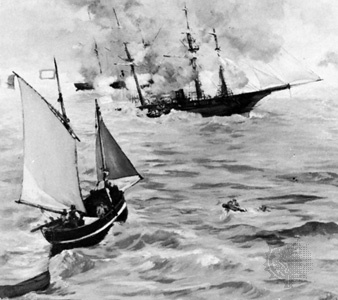Alabama claims
United States history
 maritime grievances of the United States against Great Britain, accumulated during and after the American Civil War (1861–65). The claims are significant in international law for furthering the use of arbitration to settle disputes peacefully and for delineating certain responsibilities of neutrals toward belligerents. The dispute centred on the Confederate cruiser Alabama, built in England and used against the Union as a commerce destroyer, which captured, sank, or burned 68 ships in 22 months before being sunk by the USS Kearsarge off Cherbourg, Fr. (June 1864).
maritime grievances of the United States against Great Britain, accumulated during and after the American Civil War (1861–65). The claims are significant in international law for furthering the use of arbitration to settle disputes peacefully and for delineating certain responsibilities of neutrals toward belligerents. The dispute centred on the Confederate cruiser Alabama, built in England and used against the Union as a commerce destroyer, which captured, sank, or burned 68 ships in 22 months before being sunk by the USS Kearsarge off Cherbourg, Fr. (June 1864).At the outset of the war, a Federal blockade of Southern ports and coasts automatically extended belligerent status to the Confederacy. To protect its own interests, Britain took the lead among European countries in proclaiming its neutrality (May 14, 1861). The Confederacy immediately set about building a navy to engage the Union's naval power and to destroy its merchant marine. Along with several other ships, the Alabama was built or fitted out privately on British territory and put to sea despite the belated intervention of the British government.
As early as October 1863, the U.S. minister to Great Britain, Charles Francis Adams (Adams, Charles Francis), protested that the British must take responsibility for the damages caused by British-built Confederate raiders, but he conceded that his government would be willing to submit the matter to arbitration. Amid bombastic U.S. threats of annexing Canada, Anglo-American misunderstanding was exacerbated after the end of the Civil War by unsettled disputes over Canadian fisheries and the northwestern boundary. A proposed settlement in the Johnson-Clarendon Convention was angrily rejected by the United States. To avoid further deterioration of Anglo-American relations, a joint high commission was set up, and on May 8, 1871, the parties signed the Treaty of Washington, which, by establishing four separate arbitrations, afforded the most ambitious arbitral undertaking the world had experienced up to that time. In addition, Great Britain expressed official regret over the matter.
Certain wartime maritime obligations of neutrals, already agreed to in article 6 of the treaty, were outlined in the principal arbitration of the Alabama claims, meeting at Geneva, as follows: that a neutral government must use “due diligence” to prevent the fitting out, arming, or equipping, within its jurisdiction, of any vessel believed to be intended to carry a war against a power with which it was at peace and to prevent the departure of such a vessel (the substance of this clause was included in article 8 of the 1907 Hague Convention) and that a neutral must not permit its ports or waters to be used as a base of naval operations for similar purposes. In addition, on Sept. 14, 1872, the tribunal voted unanimously that Britain was legally liable for direct losses caused by the Alabama and other ships and awarded the United States damages of $15,500,000 in gold.
This settlement gave new impetus to the process of arbitration, which had been latent for many years.
- Johann Friedrich Böhmer
- Johann Friedrich, Graf von Struensee
- Johann Friedrich Herbart
- Johann Friedrich Meckel
- Johann Friedrich Miescher
- Johann Friedrich Oberlin
- Johann Friedrich Overbeck
- Johann Friedrich Pfaff
- Johann Friedrich Schönemann
- Johann Friedrich Struensee, Graf von
- Johann Friedrich Willading
- Johann Froben
- Johann Fust
- Johann Gaudenz von Salis-Seewis
- Johann Georg Albrechtsberger
- Johann Georg Bodmer
- Johann Georg Gichtel
- Johann Georg Hagen
- Johann Georg Hamann
- Johann Gerhard
- Johann Gottfried Eichhorn
- Johann Gottfried Galle
- (Johann) Gottfried (Jakob) Hermann
- Johann Gottfried von Herder
- Johann Gottfried Walther